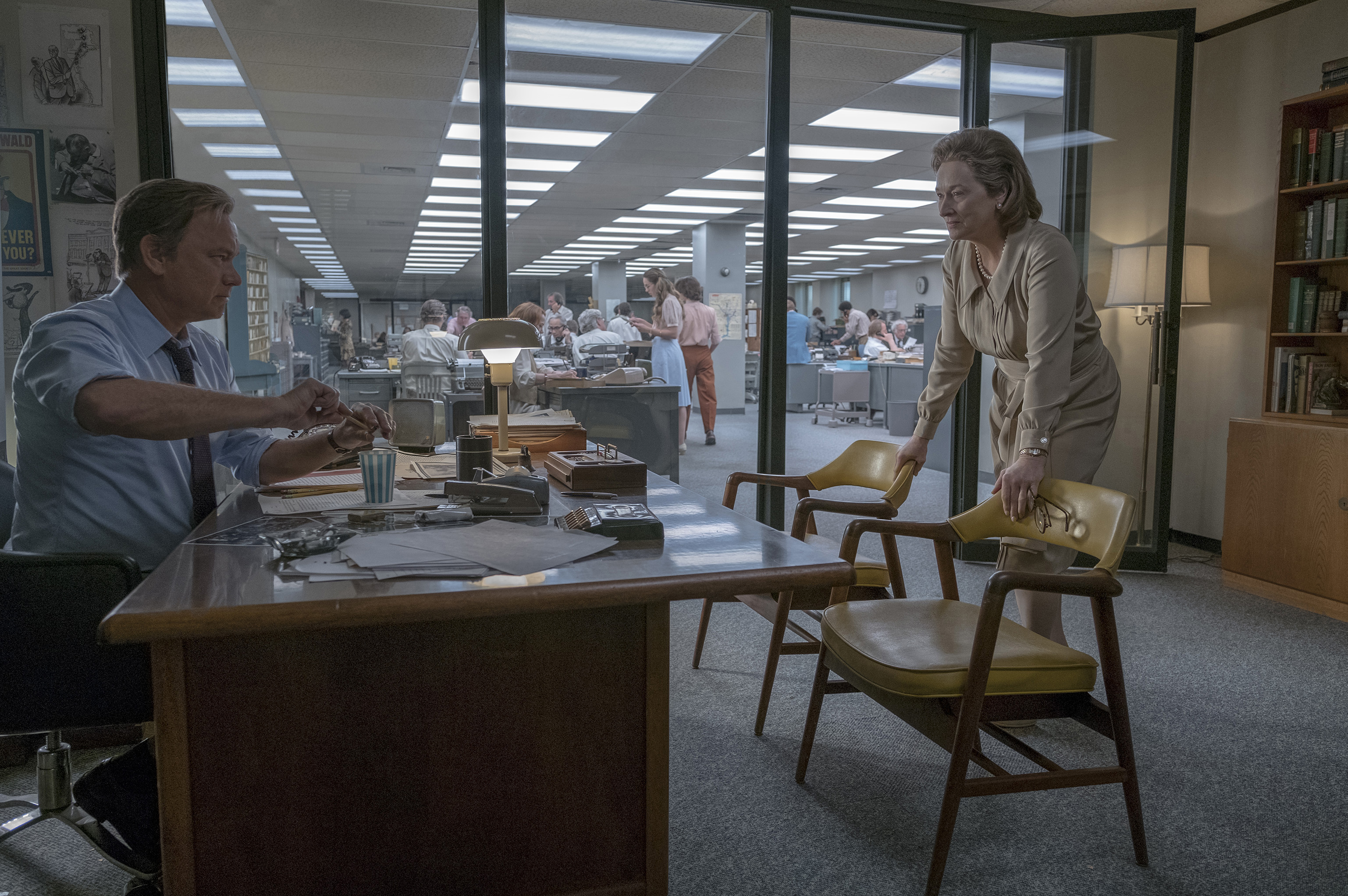Are Molly's Game and The Post too obviously about 2017?
How Hollywood filters history through the values of the present


A free daily email with the biggest news stories of the day – and the best features from TheWeek.com
You are now subscribed
Your newsletter sign-up was successful
Director Steven Spielberg's new historical drama The Post tells the story of how first The New York Times and then The Washington Post defied the demands of the federal government and published the stolen Department of Defense documents that came to be known as "the Pentagon Papers," scoring an important victory for freedom of the press. Throughout the picture, Spielberg's crew does a remarkable job of recreating the New York City and Washington, D.C., of 1971. And yet one of the movie's most memorable moments is clearly from the perspective of 2017.
About halfway through the film, Post publisher Katharine Graham (played by Meryl Streep) walks up the steps of an imposing financial institution for a meeting about the future of her newspaper. Outside the enormous doors, various female assistants have gathered, waiting for their bosses. But "Kay" passes through the scrum of ladies in dresses, entering a society of darkly suited men, who seem only to allow her inside because she's too rich to reject.
Is treating history this way savvy or distracting? At the end of The Post, there's another blunt scene involving Graham and steps, as she descends triumphantly from the Supreme Court and passes a group of activist young women who look at her with awe. Those few seconds of screen-time are sweet, and well-earned. But decades from now they're going to mark this film as very much a product of the late 2010s — when American popular culture became uncommonly preoccupied with the issue of feminine empowerment.
The Week
Escape your echo chamber. Get the facts behind the news, plus analysis from multiple perspectives.

Sign up for The Week's Free Newsletters
From our morning news briefing to a weekly Good News Newsletter, get the best of The Week delivered directly to your inbox.
From our morning news briefing to a weekly Good News Newsletter, get the best of The Week delivered directly to your inbox.
Maybe that's okay. For one thing, The Post (in limited release on Dec. 22, before opening wide on Jan. 12) fit what's become a trend toward sneaky social relevance in Spielberg's recent work. Lincoln frames modern civil rights through the squabbling of U.S. congressman over slavery 150 years ago. Bridge of Spies uses Cold War intrigue as the backdrop for a story about civic responsibility. And now The Post arrives at a time when the integrity of news-gathering organizations is again under attack from the executive branch.
The saga of the Pentagon Papers is complicated, and not necessarily inherently dramatic, involving the efforts of military analyst Daniel Ellsberg to expose a decade of deadly lies from multiple presidential administrations. Spielberg and screenwriters Liz Hannah and Josh Singer make the story both comprehensible and relatable by focusing on the reactions of two people: Graham and Washington Post editor Ben Bradlee (Tom Hanks).
The Post positions Bradlee and Graham as allies with similar skills but diverging reputations. The editor is notoriously demanding, with a sterling resume that commands his underlings' respect. His publisher inherited her position, and in the movie is constantly (if quietly) questioned about her commitment. Both The Post's stalwarts exploit their social connections. Bradlee became a star journalist thanks to his friendship with President John F. Kennedy, while Graham's parties were attended by anyone of note in Washington, which put her finger on the pulse of the American government.
A lot of what The Post is ultimately about is how the decision for The Washington Post to publish the Pentagon Papers — and to protect the public's right to know how their tax dollars were being spent — was the result of two heroic acts, each with their own risks.
A free daily email with the biggest news stories of the day – and the best features from TheWeek.com
Bradlee's courage was in-line with what anyone should've expected. He was a Kennedy man, disinclined to protect the Richard Nixon administration; and he was a veteran newspaperman, excited to pass along any story that the powers-that-be wanted to bury. Graham though put her longstanding friendship with men like Secretary of Defense Robert McNamara at stake, and jeopardized what many in her immediate circle saw as her only asset: ownership of a legacy media company.
Spielberg and his writers get across what was important about the Post taking over the Pentagon Papers project from the Times. But while The Post celebrates the free flow of information — then and now — it's primarily about the businessmen who expected Kay Graham to follow their advice to kill the series, and how shocking and revolutionary it was when she ignored them and said, "Let's go."
The misadventures of poker hostess Molly Bloom are less historically significant than what Graham did, but writer-director Aaron Sorkin's Molly's Game (in limited release on Christmas day, before going wide Jan. 5) still touches on a lot of the same themes as The Post, in terms of how it depicts what some powerful men expect of women. Sorkin's adaptation of Bloom's memoir — starring Jessica Chastain as Molly — is unexpectedly relevant to today's headlines, given that the heroine's time running a high-stakes card game brought her into contact with the Russian mob, the FBI, and multiple serial harassers.
Sorkin is best known as the Oscar-winning screenwriter of The Social Network and the Emmy-winning creator of The West Wing. He's also notorious for having a curious, at-times-problematic relationship with his female characters. He writes women who come across as whip-smart and naturally witty, but who also seem easily flustered and in need of a wise man's guidance. So it goes in Molly's Game.
Early in the film, Chastain's Molly Bloom is belatedly arrested for writing a book about her business. For years, she hosted an exclusive poker game, first in Los Angeles and then in New York City, attended by some of the richest and most famous men in the world. While Bloom consults with her reluctant-but-sage attorney (played by Idris Elba), the movie flashes back to tell her story, making it clear throughout that Molly succeeded because she was sharp, detail-oriented, and unusually compassionate.
Yet despite her obvious gifts, she still apparently needed her disapproving father (Kevin Costner) to set her straight, in an awkwardly contrived scene that lands with a thud not long before the closing credits. Despite that — or perhaps even because of it — the extent to which Bloom 's steady rise, rapid fall, and relatively soft landing depend on men becomes a big part of what makes Molly's Game so compelling.
Sorkin knows how to tell a story. He's always crafted scripts that have an effortlessly engaging, entertaining quality — like being seated at a dinner party next to someone who has hundreds of amazing, little-known anecdotes at the ready. Molly's Game is his debut as a feature film director, and aims to overwhelm viewers with its verbiage and digressions from minute one.
Whatever artificial limitations Sorkin puts on his female characters though, he's empathetic enough to understand that Molly Bloom's story is about a woman being controlled and underestimated by a succession of presumptuous jerks. Her dad bullied her when she was training to be an Olympic skier. The man who brought her into the poker business resented that she was better at it. Her players assumed the worst about her morals, and took advantage of her good heart. Even her attorney is condescending at times.
Granted, Sorkin is a little condescending too. But he also cuts away a lot to men eyeing Molly, getting across what it's like to be a woman in a position of power, worrying about reputation, physical appearance, and whether or not she's nurturing enough to the male clients she relies on for her income. Even the way Sorkin seems to misunderstand Molly is interesting in a way — especially at this time when we keep finding out over and over that Hollywood's prominent progressives are secretly creeps, who pay lip service to feminism in public while privately abusing their positions of power.
Years from now, some may watch Molly's Game and wonder why Sorkin didn't focus more on how volatile, implacable international criminals ruined her game (just as they seem intent on doing to democracy around the world), or on how the booming popularity of poker exposed some of the hypocrisies of the American legal system. Similarly, some may find The Post too obsessed with Graham — or that the movie made her seem more dithering than she was actually known to be.
But that's the trade-off for getting masterful pop artists like Spielberg and Sorkin to tell true stories. They're going to bring the past to life, and they're going to explain what they think it means, shaded by their own perspectives and biases. Questioning their choices is what makes their work part of a valuable ongoing conversation, rather than a static museum piece, set to be packed away being glass.
Noel Murray is a freelance writer, living in Arkansas with his wife and two kids. He was one of the co-founders of the late, lamented movie/culture website The Dissolve, and his articles about film, TV, music, and comics currently appear regularly in The A.V. Club, Rolling Stone, Vulture, The Los Angeles Times, and The New York Times.
-
 How the FCC’s ‘equal time’ rule works
How the FCC’s ‘equal time’ rule worksIn the Spotlight The law is at the heart of the Colbert-CBS conflict
-
 What is the endgame in the DHS shutdown?
What is the endgame in the DHS shutdown?Today’s Big Question Democrats want to rein in ICE’s immigration crackdown
-
 ‘Poor time management isn’t just an inconvenience’
‘Poor time management isn’t just an inconvenience’Instant Opinion Opinion, comment and editorials of the day
-
 Walter Isaacson's 'Elon Musk' can 'scarcely contain its subject'
Walter Isaacson's 'Elon Musk' can 'scarcely contain its subject'The latest biography on the elusive tech mogul is causing a stir among critics
-
 Welcome to the new TheWeek.com!
Welcome to the new TheWeek.com!The Explainer Please allow us to reintroduce ourselves
-
 The Oscars finale was a heartless disaster
The Oscars finale was a heartless disasterThe Explainer A calculated attempt at emotional manipulation goes very wrong
-
 Most awkward awards show ever?
Most awkward awards show ever?The Explainer The best, worst, and most shocking moments from a chaotic Golden Globes
-
 The possible silver lining to the Warner Bros. deal
The possible silver lining to the Warner Bros. dealThe Explainer Could what's terrible for theaters be good for creators?
-
 Jeffrey Wright is the new 'narrator voice'
Jeffrey Wright is the new 'narrator voice'The Explainer Move over, Sam Elliott and Morgan Freeman
-
 This week's literary events are the biggest award shows of 2020
This week's literary events are the biggest award shows of 2020feature So long, Oscar. Hello, Booker.
-
 What She Dies Tomorrow can teach us about our unshakable obsession with mortality
What She Dies Tomorrow can teach us about our unshakable obsession with mortalityThe Explainer This film isn't about the pandemic. But it can help viewers confront their fears about death.
